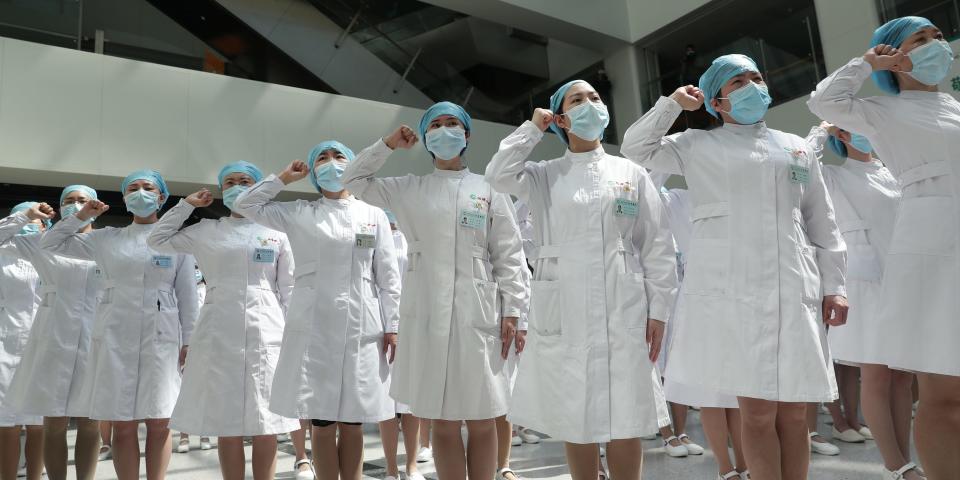Wuhan ordered all its 11 million residents to be tested for the coronavirus after 6 new cases were found, ending the city's 35-day streak of no new infections

A man under a bridge of the Yangtze river in Wuhan, China, on April 15.
REUTERS/Aly Song
The Chinese city of Wuhan on Monday has ordered all of its 11 million residents to be tested for the novel coronavirus.
Six new cases were found Saturday and Sunday in the same residential compound located in the city's East West Lake district.
The six cases are linked to an 89-year-old man who first exhibited symptoms on March 17 but was thought to have recovered and reportedly did not see a doctor at the time.
The new cases marked the end of a 35-day run of no new daily infections in Wuhan. The city ended a lockdown April 8, and life has returned to a recognizable pace.
Related Video: How Viruses Like the Coronavirus Mutate
The Chinese city of Wuhan on Monday ordered all of its 11 million residents to be tested for the novel coronavirus after discovering six new cases over the weekend.
Five people from the Sanmin residential compound in the city's East West Lake district tested positive Sunday. They were all linked to an 89-year-old man who tested positive Saturday.
The six new cases ended a 35-day run in which no new infections were reported in the city. Before this, Wuhan most recently reported a new case on April 3.
Wuhan also ended its 76-day lockdown on April 8. Since then, the flow of people into the city has restarted, with public transport, restaurants, and parks operating largely as normal.
On Monday, the epidemic prevention and control headquarters of Wuhan issued an emergency notice requiring district authorities to submit plans for mass testing on Tuesday, according to The Washington Post and The New York Times.

Nurses at Wuhan Tongji Hospital on Tuesday.
China Daily via REUTERS
Elderly and infirm people are to be tested first, followed by those living in densely populated areas and places with large migrant populations.
At least 1 million people have been tested so far, The Post said, citing the Yicai financial news website.
A 35-day clean streak doesn't mean the outbreak is over, authorities warn
"It is important to realize that a decisive result does not equal a decisive victory, lowering the emergency response level does not equal lowering defenses," Wang Zhonglin, a top Communist Party official based in Wuhan, was quoted by Changjiang Daily as saying, according to The Post.
"We must not be careless or lax."
The 89-year-old man first reported symptoms of the virus on March 17 but did not see a doctor and was thought to have recovered at his home after 10 days, The Post reported.

People inside a Tesla showroom at a shopping mall in Wuhan on March 30.
Reuters
Wu Zunyou, China's chief epidemiologist, said that in some cases the virus could endure for more than a month.
"The course of disease could last 30 to 50 days for some patients," Wu told state network CCTV, according to The Post.
"The virus could take longer to manifest itself in patients with weak immunity, who are also prone to 'ons' and 'offs' of symptoms."
However, Wu said he did not expect the small outbreak to snowball into a second wave of infections.
"There will not be a new minor peak," Wu said. "We will not allow scattered cases to develop into massive outbreaks."
Sanlin, the residential compound where the new cases were found over the weekend, had reported 20 infections while the city was on lockdown.
All 5,000 residents of the compound have now been told to get nucleic acid testing, according to The Post.
On Monday, just one new case of the virus was reported across the whole of China, according to the National Health Commission.
Read the original article on Business Insider

